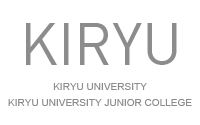
KIRYU UNIVERSITY Department of Nursing
At the Department of Nursing, Kiryu University,
you will be able to find your guaranteed future life.
At the Department of Nursing, a wide variety of clinical training is provided through cooperation with hospitals and welfare facilities in the community.
So that you can become a nurse with expertise and humanity who can contribute to the community based on a practical understanding of community issues.
You can experience four years that guarantee your future life here.
| Feature 1 |
Curriculum that provides you with wide-ranging knowledge
Today’s nurses are required not only to have nursing skills but also to demonstrate research capabilities and educated knowledge as a member of a healthcare team. This department will develop the skills necessary for on-site research, including literature searches, information collection, and paper writing. In addition, considering the characteristics of this district where there are many people with foreign nationalities, the curriculum allows you to take not only a second foreign language but also a third foreign language. This curriculum is quite characteristic of Kiryu University, which has a close relationship with the community.

| Feature 2 |
Step-by-step hands-on training that cultivates genuine practical skills
Through cooperation with the community that Kiryu University has cultivated for a long time, you will be provided hands-on training at many medical institutions, welfare facilities, and other programs near the University. You can practically understand and learn of the problems of the community, such as the declining birthrate and an aging population, while thinking about how you should work as a nurse.
Clinical training provided from the early stage of the course
In the external training that you will start in your first year of university, you can master genuine skills by practicing the knowledge you acquire in the lectures. Teachers accompany you to the places for practical training for a detailed follow-up.
First year
◆Early-stage hands-on joint training (July)
You will deepen your knowledge with team medical care in mind for your future.
◆Practical training in hospitals (February) [For about a week]
Second year
◆Practical training in hospitals (November) [For about two weeks]
◆Practical training in nursing care for the period of old age(February) [For about a week]
You will learn about the support for the health of the aged through recreation activities with old people in the community and study tours to day-care centers.
Third year
◆Practical training in hospitals (April to July and September to October) [For two weeks each]
You will receive practical training divided into technically different groups, such as childhood and adulthood.
Fourth year
◆Nursing seminar [For about a month]
You will select themes based on your interests from the lectures and practical training during the three years in the department and receive practical training in the nursing seminar in your fourth year of university as the culmination of your studies. You will develop an operation plan, verify it in the external training, and write a report on the results and considerations.

| Feature 3 |
A nurse who can always empathize with others from the heart
In the healthcare field, many medical professionals work on a team. They have many opportunities to meet patients and their families. This department provides education focusing on improvement in communication skills to become a nurse who has an awareness of cooperation and who can empathize with others.
Volunteer activities of assuming the role of an invalid in a disaster medical care drill
Disaster exercise in a hospital
You will observe doctors, nurses and the Disaster Medical Assistance Team (DMAT) by playing the role of a patient in order to fully understand the importance of cooperation between staff members. In the exercise, you can actually experience the great anxiety that patients may feel when left as they are in a chaotic situation. Saying simply “Is it cold in here?” may alleviate their anxiety. You will be able to aim at becoming a nurse who can make level-headed decisions while empathizing with patients.

| Feature 4 |
Service-minded education that meets the needs of each student
The department supports learning on a small-group basis by assigning one teacher to a group of several students to supervise their progress in learning and career choice for the success of all students in the exam. The department focuses on support for not only students aiming at becoming nurses but also those aiming to become public health nurses and school nurses.
Support for the success of all students in the acquisition of the national license as a nurse
Accumulate knowledge from a long-term perspective and cap off the learning with the exam preparation program!
STEP 1
Increase in the awareness of taking the national exam
Questions similar to the national exam are on the regular tests so that students can have an awareness of the national exam on a routine basis.
Preparation for the national exam
Not only some teachers in charge but almost all teachers have worked on the preparations for the national exam since fiscal 2012 in order to maximize all students’ performance and motivation. Learning on a small-group basis can deepen the relationship with teachers and fellow students! One teacher is assigned to each group of three to six students to promote preparation for the national exam.
STEP 2
Five-week program for preparation for the national exam
You will receive an intensive learning program in February of your third year of university by which you can check your weak subjects and find the challenges to overcome.
STEP 3
Effective learning in a small group
You will receive support for learning in a group of three to six students, to which one teacher is assigned, in your fourth year of university. Fine-tuned guidance on learning and life will be provided based on the learning level of each student.

| Feature 5 |
Career support for realization of your dream
The appeal of Kiryu University is that you can meet with people in various positions through on-site training at community medical institutions, health facilities, and welfare facilities, as well as internal and external volunteer activities, through which you can think about your future lives from various perspectives. Based on your thoughts, the University will provide full support you so that you can find jobs that meet your wishes and competences.
The appeal is the number of hospitals and facilities where you can receive practical training!
<Obtainable licenses and qualifications for them>
・Nurse (Qualification for taking the national exam)
・Public health nurse (Qualification for taking the national exam) – Selective –
・School nurse’s license type 1 – Elective –
・School nurse’s license type 2 (Obtainable by application for the license after passing the national exam for public health nurses)
・Health supervisor’s license type 1 (Obtainable by application for the license after passing the national exam for public health nurses)
<Expected career options after graduation>
・Public offices…prefectural governments, city halls, town offices, and other facilities
・Educational institutions…senior high schools, junior high schools, and elementary schools
・Medical care facilities…hospitals and clinics
・Welfare-related facilities…welfare facilities for the aged
・Further education…graduate schools
・Others…businesses and other enterprises

<The kind of students admitted>
The Department of Nursing develops the base for human resources that play a lifelong active role in nursing as demanded by society under the circumstances of increasingly sophisticated, specialized, complicated, and diversified healthcare. Therefore, the department seeks students who can prepare for their occupations, pay attention to the lives of people in various situations, and arrange their own daily lives in a self-sustaining way.
<Educational policy>
Faculty of Health Care, Kiryu University
1. Developing professionals with extensive knowledge, genuine skills, and excellent readiness while cultivating an ethical sense of honoring the dignity of life, as well as respecting and protecting human rights.
2. Developing human resources that can contribute to a new era and the global community with a focus on an understanding of humanity by considering healthcare, medical care, and nutrition as one field of integrated human science.
Department of Nursing
1. Developing the comprehensive capabilities of the knowledge, skills, attitudes, and thoughts as a self-sustaining profession
2. Developing a rich sense of humanity based on an understanding of human beings and an awareness of cooperation
3. Developing professionals with especially advanced skills who can contribute to the local community and the global community
4. Developing practical professionals who can demonstrate capability in the environment of healthcare, medical care, and welfare in the local community
<Educational features>
To become a nurse
with sophisticated skills that can respond to increasingly specialized and diversified actual medical situations
and the mind to contribute to a community that faces a declining birthrate and an aging population
・Clinical training provided at many facilities and institutions near the University
in order to lead the understanding of community issues on-site to an active role played after graduation
Through cooperation with the community that Kiryu University has cultivated for a long time, you will be provided hands-on training at many medical institutions, welfare facilities, and other programs near the University. You can practically understand and learn of the problems of the community, such as the declining birthrate and an aging population, while thinking about how you should work as a nurse.
・Education focusing not only on the expertise as a nurse but also
on an awareness of cooperation for working on a team and the humanity of empathizing with others
In the healthcare field, many medical professionals work on a team. They have many opportunities to meet patients and their families. This department aims to develop nurses with an awareness of cooperation in which they can demonstrate their expertise while respecting and empathizing with others.
・Developing the skills necessary for conducting lifelong research as a nurse,
including literature searches, information collection, and paper writing, in their four-year studies at the University
Today’s nurses are required not only to provide nursing skills but demonstrate research capabilities as a member of a healthcare team. You will develop the skills necessary for on-site research, including literature searches, information collection, and paper writing, under the guidance of teachers with a wide variety of expertise.
・Service-minded education that meets the needs of each student,
including a well-developed support system for passing the national exam
The uniquely fine-tuned support system for passing the national exam provides a small-group-based environment in which one teacher is assigned to a group of several students to supervise the progress of each student in learning and career choices for the success of all students in the exam. The department also focuses on providing support for students aiming to become public health nurses and school nurses.




